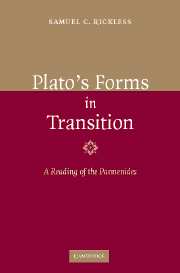Book contents
- Frontmatter
- Contents
- Preface
- List of abbreviations
- Introduction
- Chapter 1 The theory of forms
- Chapter 2 The theory criticized
- Chapter 3 The theory modified: methodology
- Chapter 4 The First Deduction
- Chapter 5 The Second Deduction
- Chapter 6 From the Appendix to the Fourth Deduction
- Chapter 7 From the Fifth to the Eighth Deduction
- Conclusion
- References
- Index of forms discussed
- Index of Deductions
- Index of passages cited
- General index
Chapter 5 - The Second Deduction
Published online by Cambridge University Press: 22 September 2009
- Frontmatter
- Contents
- Preface
- List of abbreviations
- Introduction
- Chapter 1 The theory of forms
- Chapter 2 The theory criticized
- Chapter 3 The theory modified: methodology
- Chapter 4 The First Deduction
- Chapter 5 The Second Deduction
- Chapter 6 From the Appendix to the Fourth Deduction
- Chapter 7 From the Fifth to the Eighth Deduction
- Conclusion
- References
- Index of forms discussed
- Index of Deductions
- Index of passages cited
- General index
Summary
The Second Deduction is by far the longest stretch of reasoning in the Parmenides. It consists of thirty-three separate arguments covering close to fourteen Stephanus pages (142b1–155e3), which represents roughly one-third of the dialogue. The purpose of D2 is to establish results of the form: If the one is, then the one is both F and con-F (in relation to itself and in relation to the others). So if D2 succeeds, Parmenides will have shown that if the one is, then RP is false.
D2A1 (142b1–c7)
D2A1 establishes two conclusions, (C1) that if the one is, then the one partakes of being, and (C2) that if the one is, then the one is not the same as being.
Recall first that, by SBP, to say that X partakes of being is to say that X is. This entails (C1) that if the one is, then the one partakes of being.
Now assume (P1) that if X partakes of the F, then the F is, (P2) that if the F is and the G is the same as the F, then to say that X partakes of the F is to say that X partakes of the G, and (P3) that to say that X is is not to say that X is one. By P1, if the one partakes of being, then being is. So C1 and P1 together entail (L1) that if the one is, then being is.
Information
- Type
- Chapter
- Information
- Plato's Forms in TransitionA Reading of the Parmenides, pp. 138 - 187Publisher: Cambridge University PressPrint publication year: 2006
